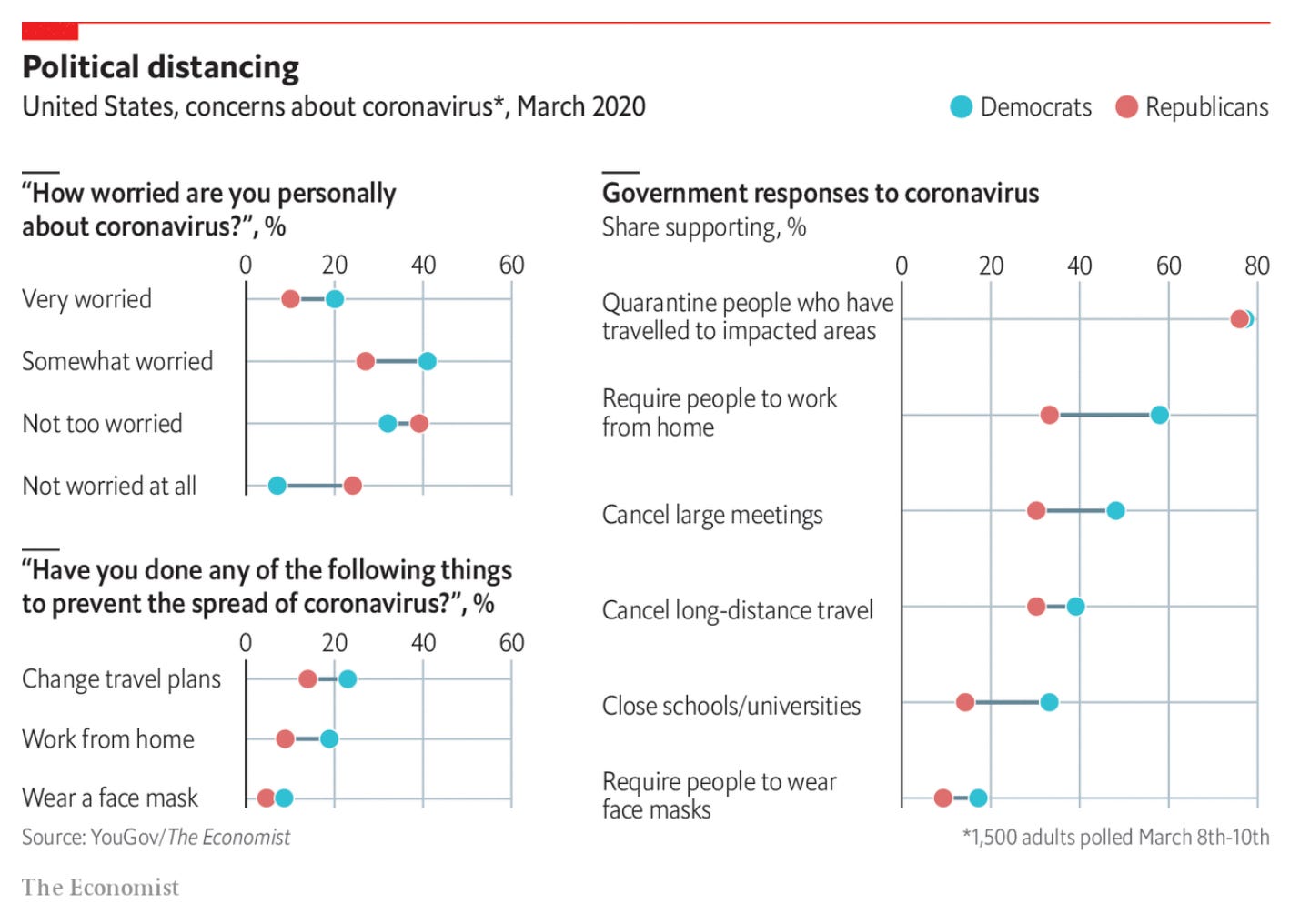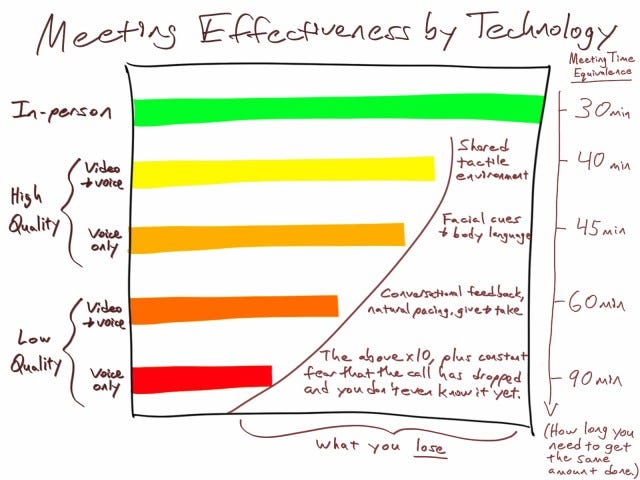Social change in a time of social distance

Hi. Your friendly neighborhood facilitator here.
Have you been getting a lot of messages about how your local library, every nonprofit you know, and that furniture store that somehow has your email address are all responding to coronavirus?
This isn't one of those emails. But if you've been wondering what the pandemic means for social change work—then let's explore.
Despite the massive uncertainty, a few things seem clear.
First, our goals will shift. A pandemic will hit hardest those who are already marginalized or vulnerable: anyone who is poor, elderly, disabled, immigrant, uninsured, working class, incarcerated, and more. It also will (already is) shifting our politics—but will the frame of that shift go beyond blame, extending to a new appreciation for the value of a social safety net? Of good governance, expertise, and the civil service? What happens if the pandemic has disproportionate impacts across political divides: young v. old and rural v. urban?
See "scenarios and risks" (next section) for some smart early thinking on these dynamics.
Second, we must change how we work: more flexible, more distributed, more virtual. A few folks have pointed out that the shift toward more virtual/remote collaboration should already be underway, for climate reasons if not for work-life balance. I've had several clients embed this shift into their strategies or plans in recent years, e.g. with commitments to distribute staff globally. The pandemic will force more teams to move in this direction.
See "virtual and distributed collaboration" (below) for a compilation of tip sheets, tools, and ideas.
Finally, things will get worse before they get better. The strategic and programmatic dimensions shouldn't detract from the deeply personal ones: the pandemic will bring a lot of anxiety and risk to those doing social change work. Wash your hands and keep your distance—but also be generous, and take care of each other.

In the US, Democrats are more worried about coronavirus than Republicans. (via The Economist)
Scenarios and risks
As mentioned, it's hard to say what comes next. But some smart people are helping us see around the next corner.
Why outbreaks like coronavirus spread exponentially, and how to "flatten the curve"
Still getting your head around the dynamics of the pandemic and why we need to be social distancing now? Check out these animated models from Washington Post graphics reporter Harry Stevens.
How might a pandemic affect US society and politics in 2020?
Eli Pariser, Taren Stinebrickner-Kauffman, and others shared a read-out on a recent gathering of activists, organizers, and technologists on the potential knock-on effects of a pandemic. They explored the political impacts (on campaigning, in-person voting, and the framing of issues like health care or paid sick leave), the differential impacts on immigrant and other vulnerable communities, the implications for institutional leadership and governance, and more.
Social Justice in a time of Social Distancing
Kenneth Bailey and Lori Lobenstein look at what the coronavirus response implies for social arrangements that focus us on individuality over collective action—and how to rebuild politics during and after the pandemic.
How a bad response to coronavirus will make things worse
Sociologist, humanitarian consultant, and science fiction author (whew!) Malka Older talks about the importance of social capital and trust in disaster responses, and how a bad response can undermine these and fracture communities based on which sources they trust.
What the fight against Ebola can teach us about beating the coronavirus
In a similar vein, Accountability Lab founder Blair Glencorse recounts the role of governance, trust, and community organizing in Liberia's 2014 Ebola response.
On the Frontlines of the Pandemic, Local Philanthropy Scrambles to Respond
Paul Karon writes for Inside Philanthropy on how community foundations in Seattle and Westchester are trying to support nonprofits and vulnerable communities.
How the Coronavirus Revealed Authoritarianism’s Fatal Flaw
The always-insightful Zeynep Tufekci on how censorship in China makes it harder for not only citizens but also those in power to know what's happening.
Bonus: Plagues follow bad leadership in ancient Greek tales
Famines are man-made. So are pandemics.
There's an important idea from the humanitarian sector that famines are not natural disasters. They're not caused by crop loss or droughts or even a lack of food. There's always enough food in this world: it's just not reaching the people who need it.
Famines are caused by market failures, and government inability or unwillingness to respond. A drought may be natural, but a famine is man-made.
It's slowly dawning on folks that the same is true of pandemics. There are lots of nasty bugs in the world. But it takes a special cluster of institutional failures to get us where we are today.
As Malka Older writes: "The virus itself is natural, but our human interaction with it—the way the response is being managed by various governments and institutions—can become a self-inflicted disaster."
This idea has implications for the story we tell ourselves about how we got here, and for what happens next. Was this a circumstance beyond anyone's control? An unavoidable outgrowth of globalization? The failure of government in general?
There's little to suggest that authoritarian-leaning regimes (China, Iran) are any better or worse at containing pandemics than democratic-leaning ones (Italy, South Korea, USA). But while both have failed, they've failed differently.
The weakness of authoritarianism is the need to maintain the illusion of strength, which manifested in China censoring early reports while the epidemic spread. Once the government acknowledged the problem, their response got kudos from the World Health Organization, even as it enacted draconian measures that may not have been necessary if they'd responded sooner.
In contrast, the United States is plagued by censorship-via-noise, a hollowed-out administrative state, and a lack of positive leadership from the top. These have become core features of our besieged form of democracy, especially in the last three years. Now that state and local officials are starting to respond, we see some gritted determination and maybe even anxious optimism about the road ahead.
In the social change sectors, the question for our long-term response is: do we treat pandemics as merely global health problems, requiring better early warning systems and medical supply stockpiles? Or are they (also) institutional and governance problems—requiring greater investments in democracy, civil service, independent media, anti-disinformation, and collective action?

From a post I wrote a few years ago: "On the non-flatness of the world"
Virtual and distributed collaboration
There's a lot of advice floating around—see below—on how to shift toward virtual, remote, and distributed collaboration. The common theme: be deliberate and intentional about the shift. Don't just expect a slack channel to replace in-person convos, or slide your regular agenda into a zoom call. Take this moment to design how you work together, and you may find yourself forced into creative methods that make you more effective than you were before.
Remote/virtual work and management
Coronavirus Could Force Teams to Work Remotely - from HBR. Advice includes: spell out goals and roles; emphasize personal interactions; and normalize new work environments.
Going Remote Overnight: Preparing for the Coronavirus - organizational design firm NOBL has tips on policies, systems, and people. My favorite: "Tighten your shared rhythms and rituals as a company."
5 Tips for Managing Remotely During COVID-19 - from The Management Center. Good tips overall, and one that I really like: "Check in with each staff person about their remote work set-up." That is, don't just leave it to everyone to figure out on their own; help them optimize their equipment and space.
Nine tips for virtual NGO team leadership from a pro - from Oxfam International's head of fundraising support, Amanda Briggs-Hastie, writing on the Five Oaks Consulting blog.
Workshops, meetings and conferences
Tips on virtual/IRL hybrid meetings - a good set of practices, from Sierra Club's distributed organizing teams.
Lessons learned from organising our first virtual conference - Helena Rose of the Tax Justice Network shared what they learned from their half-day event with 150 people across almost every time zone.
The Definitive Guide to Facilitating Remote Workshops - from MURAL, a "virtual whiteboard" tool. It's a little focused on design sprints (and naturally they recommend using their own tool) but it has lots of granular tips, down to which type of microphone to use.
Mastering Remote Workshops - an open google doc-in-progress from a group called #designandclimate, with some principles, a list of tools, and some case studies where others have shared what they've tried.
A Comprehensive List of Tips, Tools, and Examples for Event Organizers During the Coronavirus Outbreak - good advice on how to cancel/reschedule events, plus a long list of virtual tools to check out, from community-building consultancy CMX.
How To Facilitate Effective Virtual Meetings - nonprofit consultant Beth Kanter shares her practices, including co-creating your virtual meeting norms, and designing the meeting beyond the agenda.
Bonus: Your Colleagues Don’t Read Anything You Write. Here Are 8 Ways to Change That. - straightforward advice on better professional writing, which was always important but may be even more so now.
Meanwhile
In non-pandemic news:
Measuring People Power - great report from Mobilisation Lab on the state of practice in measuring people power, include what organizations are measuring (mostly breadth, less so depth) and how.
How Much Should I Ask For? 10 Points of Consideration for Foundation Grantees - Barbara Chow and Ruth Levine give us a peek behind the curtain with a view on what factors foundation staff consider when assessing the right amount for a grant. (Really struck that these are mostly about what's going on at the foundation—and not about the grantee or its work.)
Bluffer's Guide to Framing - communications coach Sho Konno condensed 500+ pages of PDFs from framing experts into a few key ideas for activists on communicating about race and class, climate change, and more.
Bridging the Elite-Grassroots Divide Among Anticorruption Activists - Abigail Bellows looks at how technocratic and capital-based NGOs can better work with grassroots networks and movements, with lessons beyond anticorruption work.
Updates from the work
It's been a busy few months. I recently wrapped up a strategy and implementation planning process for a major open government organization, and I'm winding down a similar process for another in the same sector. Separately, I've been supporting a new organization set their strategy on corporate accountability in the food sector. And I've been working with a few other consultants to research the needs of frontline anti-corruption reformers.
But a pandemic isn't great news for a business built on facilitation. Another client has switched their upcoming team retreat to a virtual format, which can be effective but loses some je ne sais quoi. Other potential workshops are temporarily on hold while we all figure out this new world.
Are you moving to remote or virtual methods? Drop me a line, even if you don't need an outside facilitator. I'll be interested to hear how your team is adjusting and I'm happy to soundboard some ideas to smooth the transition.
- Dave


